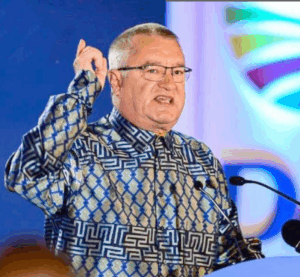Today, we can talk about figures and stats, budget cuts, performance reviews, annual performance plans (APP’s) – yet the truth is that high crime rates including violent crimes, theft and gender-based violence (GBV) remain a daily reality for many citizens in KZN. As MPLs, it is our responsibility to ensure that oversight inspections, workshops and symposiums equate to action on the ground. Unfortunately, this has not been the case in years gone by and as a result, KZN’s crime stats remain the highest in the country and will continue to escalate unless drastic measures are taken in spite of budget cuts.
KZN’s Department of Community Safety and Liaison has an almost non-existent budget, receiving the smallest portion of the entire provincial budget. Its budget of R243 million for 2024/25 is only 0.2% of KZN’s total budget and a R7 million decrease from the R250 million allocated last year.
The Democratic Alliance (DA) is committed to creating a safer, more secure KZN. Our vision is rooted in the principles of accountability, transparency, and community empowerment. We believe that by working together, as part of the Government of Provincial Unity (GPU) we can build a province where everyone feels safe in their homes, on the streets, and in their workplaces. To effectively combat crime and ensure the safety of KZN’s communities, we must tackle existing issues head-on.
Our province needs a competent police force that is well-capacitated by professional and experienced officers. It is in dire need of comprehensive training programs, innovative technologies, and robust oversight systems that enhance accountability measures.
Our province needs stronger law enforcement. We must ensure that our police force is well-trained, adequately funded, and equipped with the necessary resources to combat crime effectively. We need to increase the visibility of law enforcement officers in high-risk areas and establish specialized units to tackle specific types of crime. Police officers need to be well-equipped as a well-supported police force is essential for effective crime prevention and response.
While Community Policing Forums (CPFs) do exist – in some areas they still function independently from SAPS. This is the sad reality for many communities who have taken it upon themselves to fight crime due to an under-staffed, under-resourced or even non-existent police force.
Crime is often a symptom of deeper socio-economic issues. Without a plan to address KZN’s rising unemployment rate and the economic disparities which exist in communities, crime prevention strategies – however well placed – will be a fruitless exercise. Government cannot continue to work in silos and expect results. Investing in education, skills development and job creation and supporting local businesses have proven to reduce crime in communities. By improving economic opportunities, government can reduce the desperation that often leads to criminal behaviour and create a more stable and prosperous society.
We cannot talk about tackling crime without mentioning the plague that has taken over KZN: business forums, construction mafia, water tanker mafia, taxi violence/intimidation/harassment and bullying. The true litmus test of this 7th administration will be how these law breakers and bullies will be dealt with going forward and whether they will be met with the true might of the law – without fear or favour.
The safety and security of KZN’s women and children is a non-negotiable. DA oversight inspections of various police stations across our province show that many are still not equipped to deal with domestic abuse and assault on women and children. We reiterate our call for this to be urgently addressed. It is unacceptable that in 2024 women and children are still subjected to violent crimes. We need stricter enforcement of laws against GBV and the establishment of dedicated units within the police force to handle these cases with the sensitivity and urgency they require.
Taxpayers’ money can no longer be wasted on talk-shops. Instead, these funds must be used to establish shelters, counselling facilities and legal assistance for GBV victims. During tough economic times such as these – where all government departments are tightening the purse strings – every cent counts and every cent must go towards growth, development and change. To deal with this scourge once and for all, KZN needs to establish specialised courts to deal with crimes committed against women and children. Specialised units within SAPS must be set-up to focus on crimes affecting women, children and minors and the prosecution of those facing charges of GBV, child abuse, trafficking and murder must be prioritised and fast tracked.
In an increasingly digital world, technology can play a key role in enhancing safety and security. Yet, where are KZN’s surveillance systems, emergency response apps and data analytics to improve crime prevention and response? Not everything has to be a long-drawn-out process, with red tape, cadre deployment and jobs for pals. KZN’s new GPU must ensure that we no longer lag behind while the rest of the world continues to progress and implement innovative ways to combat crime.
The DA is committed to making KZN safer for all its residents. By strengthening law enforcement, fostering community engagement, addressing socio-economic issues, combating GBV and leveraging technology, we can create a province where everyone feels safe and protected.
A centralised police force under an incompetent central state, that abuses the law enforcement apparatus for party political ends, has resulted in the progressive collapse of policing in KZN. To effectively deter crime, we must decentralise the police service to capable provinces to ensure more local accountability and effective crime-fighting to protect citizens. Government can also work with municipalities to tailor policies and policing plans that are more appropriate to our specific needs, bringing security and safety closer to the communities we serve.
Working within the GPU we can overcome the challenges we face. But we must also recognise that achieving this vision will require a collective effort, a whole of society approach. It will demand partnerships between government, civil society, and ordinary citizens and it will require us to confront the truths of our past while embracing the opportunities of our future.
As we enter the 7th administration, the DA reaffirms its commitment to a vision of policing that is fair, transparent, and inclusive and to building a society where every South African can feel safe walking the streets of their neighbourhood, knowing that their rights are protected, and their voices are heard.







